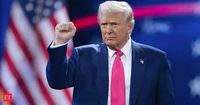In a striking reaffirmation of his contentious views toward Canada, former President Donald Trump recently stated that Canada should be the "51st state" of the United States due to what he perceives as a heavily one-sided monetary relationship between the two nations. During a Fox News interview with Laura Ingraham on March 18, 2025, he labeled Canada as one of the "nastiest countries to deal with" and claimed that the U.S. subsidizes Canada by a staggering $200 billion annually, which is a dramatic exaggeration of the actual American trade deficit of $63.3 billion reported in 2024 by the Office of the United States Trade Representatives.
Trump's comments came on the heels of Justin Trudeau's final day as prime minister, a period marked by escalating tensions between the two countries. As the dust settled on Trudeau’s administration, which some perceived as a lackluster response to Trump’s taunts, many Canadians are wondering how the newly elected prime minister, Mark Carney, will address these ongoing issues.
“Canada only works as a state,” Trump remarked, dismissing the border between the two countries as merely an "artificial line." He alluded to the concept of an annexation akin to Nazi Germany’s Anschluss movement, suggesting that it would happen sooner rather than later. "There will be a little disruption, but it won’t be very long. But they need us. We really don’t need them. And we have to do this. I’m sorry.", he said.
Carney, who took office on March 14, 2025, didn’t mince words during his first press conference, where he branded Trump’s claims as "crazy." This antagonistic back-and-forth has not only opened the doors for a public relations war but also raised questions about how Carney will diplomatically manage Trump’s relentless rhetoric.
Trump further insisted in the interview that he was "tougher on Canada than America’s adversaries." This comment appears to underline his intention to position himself as a strongman in negotiations with Canada's leadership. While his press conference remarks may sound bold, they could backfire, especially as they foster a growing sentiment of nationalist pride among Canadians who are rallying behind Carney.
Trudeau previously acknowledged the weight of Trump’s threats, describing them as "a real thing" that needed to be taken seriously. He articulated that Trump's demands might be driven by the knowledge of Canada’s abundant critical minerals. This context adds a layer of complexity to the discussions about America’s economic interests in Canada, especially as global demand for minerals intensifies.
Ontario Premier Doug Ford escalated the rhetoric when he threatened to impose a 25% tariff on electricity exports to the U.S. to assert Ontario's position; however, Trump swiftly counteracted this potential move, branding Ford as “a very strong man” after he backed down. This interaction showcases a subtle dynamic in play: while Trump’s tendency is to demand concessions from leaders, Ford’s quick turnaround hints that the Canadian provinces are steadily rallying together to affirm their sovereignty against external pressure.
Carney’s approach focuses on fostering relationships with Canada’s traditional allies. Shortly after his swearing-in, he flew to Europe to meet with French President Emmanuel Macron and UK Prime Minister Keir Starmer, aiming to strengthen ties with partners who could provide support amid growing tensions with the U.S.
This newly minted prime minister also announced Canada’s intention to purchase a CA$6 billion radar system from Australia, signaling a pivot away from dependence on American military supplies amid threats to national sovereignty. Adding further scrutiny, Carney has requested a review of a planned CA$19 billion deal to purchase 88 F-35 fighter jets from the United States, indicating a readiness to explore alternative options.
The geopolitical landscape seems to be shifting rapidly. In his first few days as prime minister, Carney has successfully leveraged the national mood; polls indicate a surge in support for policies that emphasize strength amid directionless threats from the U.S.
Trump’s focus on Canadian affairs is unique in that it may reveal deeper insecurities within his administration, which feels a need to exert dominance over its North American neighbor. Political analysts suggest that this obsession with Canada could backfire, especially in the upcoming international trade renegotiations.
Despite offering no sign of relenting in his aggressive stance, Carney has firmly stated, “We’ve called out those comments. They’re disrespectful, they’re not helpful, and they need to stop before we sit down and have a conversation about our broader partnership with the United States.”
The tenure of both leaders could impact the future relations between the two nations dramatically, making it crucial to observe how their dynamic evolves in the coming months. With both leaders seemingly unwilling to back down, one thing is for sure: the road ahead will be anything but smooth.

